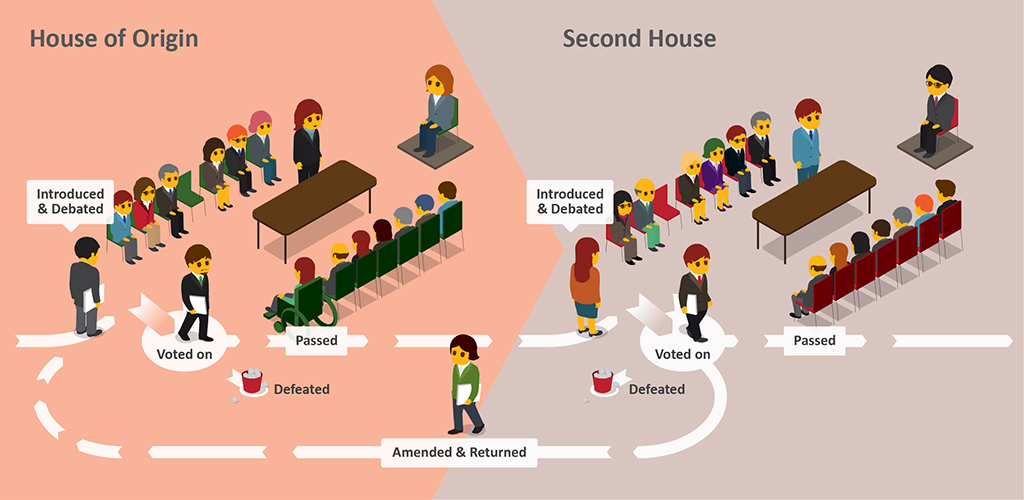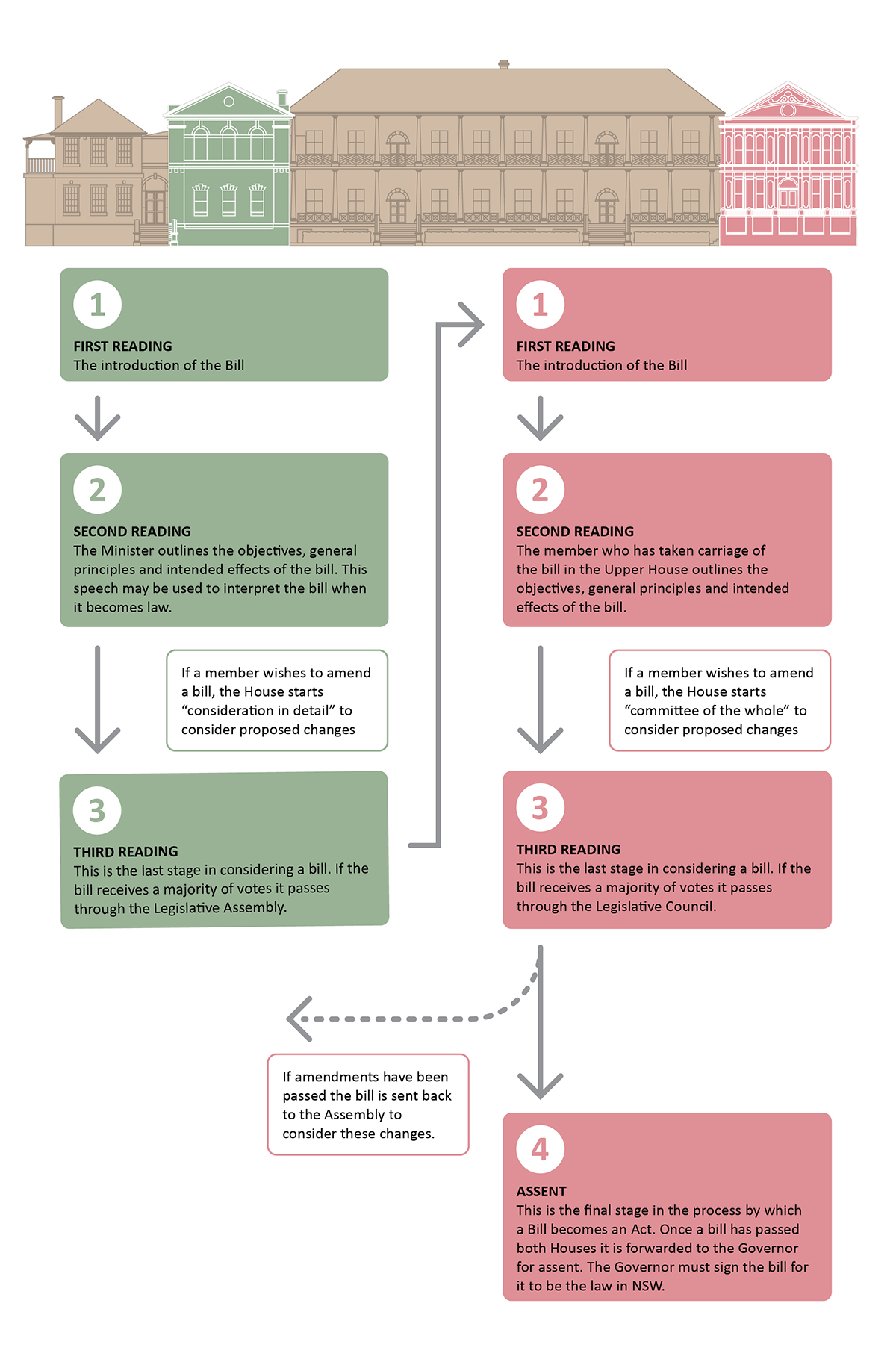What Will I Learn
- The following information and activities will help to develop an understanding of Parliament
- You will learn about the process of making statute law
- You will learn how laws are made and how they change
Why Do Laws Change?
Laws are always changing and reflect the morals and values of the society we live in. Existing laws also change when they require updating or are no longer relevant or need to be modernised. They are made either through the statutory process or common law.
Common law is made by the courts and statute law is made by the Parliament.
New and existing laws affect our rights and responsibilities and make an impact on all aspects of our lives including our future careers and the ways we work.
Did you know?
Debating and approving legislation is a major part of the workload of the parliament. Hundreds of laws are passed each year. In 2019 there were 217 laws reviewed by the Legislation Review Committee and 91 new bills presented to the chambers.
What is Legislation?
Legislation is a document containing rules that have been voted on and approved by the Parliament.
Legislation is also known as an Act or statute and tells us what the rules are in the area that it legislates upon.
Where Do Laws Begin?
The majority of Acts are initiated by the Government, and their policies may come about from urgent need for policy and legislation in emergencies, after pressure from:
- Community groups
- Media or public opinion pointing out particular needs
- Advice from government departments
- Consequences of judicial decisions

When the Government is satisfied that laws are needed, the Minister concerned submits the proposal to the Cabinet for approval and a bill is drafted, usually by the NSW Parliamentary Counsel Office. The party room is where bills will be discussed with all of the party members.
Did you know?
Any member of Parliament can initiate a bill, but many are introduced by Ministers of the government. A bill can be introduced into either the Legislative Assembly or the Legislative Council.
From Idea to Law

A bill can be introduced in either House but must pass both to become a law.
In both Houses a bill will go through multiple stages.
If the second House wishes to amend a bill passed by the House of origin, it will send the amended legislation back to the House of origin.
If the amendment is agreed to, it then becomes part of the bill – if not messages will pass back and forth between the Houses until there is agreement. Sometimes, it may be presented again later, perhaps in a different form or in another session of Parliament.
Royal Assent

This is the final stage in the process by which a bill becomes an Act. Once it has passed through all stages in both Houses, it is presented to the Governor whose formal approval is required. This process is called assent.
Special Rules About Money Bills
Under Section 5 of the NSW Constitution Act, Money Bills (bills for raising or allocating money) can only be introduced in the Legislative Assembly and if the Bill is part of the ordinary annual services of Government, the Legislative Council cannot prevent it becoming law.
Summary of The Passage of A Bill
Before a bill is introduced into Parliament the Minister or private member introducing it gives notice of their intention to introduce the bill. Copies of the bill are distributed and published on the Parliament’s website here.
Bills can be introduced in both Houses. In the below example, we will imagine a bill has been introduced in the Legislative Assembly. Once it has gone through three stages, it is forwarded to the Legislative Council.
The Council will also read the Bill in three stages and may agree to the bill without amendment and forward it to the Governor’s assent. However, it may return the bill with amendments for the Assembly’s consideration or it may not pass it.

An example of this process is captured by the Legislative Council’s summary of the passage of the Abortion Law Reform Act in 2019 available here.
A more detailed fact sheet is also available here.
When Does A Law Take Effect?
An Act will come into force 28 days after the Governor’s signature unless the Act specifies otherwise. It might be instant or at a later date.
Delegated Legislation
Through the authority of an Act of Parliament, Ministers can be handed power to make regulations, statutory rules, by-laws, ordinances, orders in council and various other ‘instruments’ made by the executive to fill in the detail of a law.
Can An Existing Law Be Reviewed
The law is constantly updated in line with social values, new concepts of justice, and in response to developments in new technologies.
- Some bills have a review mechanism built into them that suggests they should be reviewed by a committee or the Minister after a certain period of time.
- Ministers can also introduce a bill to amend an existing Act and also committees make recommendations to the Government about reform.
The Legislation Review Committee plays an important part of our legislative process. You can find more information in Law Reform and Committees.
Rights and Responsibilities CASE STUDY
The Real Estate Agent
Real estate agents are bound by law to disclose certain information when selling a property. Section 52 of Property and Stock Agents Act (NSW) 2002 establishes a list of ‘material facts’ that an agent must disclose. Agents have a responsibility to act in ways that treat consumers and the public fairly through disclosure and professional behaviour.
The Act prescribes that material facts must be disclosed to potential buyers including any information about a property that might influence a buyer’s decision in making a purchase and protects them from potential deception.
The law applies to the actions of the agent and non compliance can incur a heavy fine.
These are outlined by the legislation as well as:
- The Property and Stock Agents Regulation 2019 which sets out rules of conduct (both general and specific) that apply to both licensees and certificate of registration holders.
- The Australian Consumer Law (ACL) also applies to the conduct of real estate and property agents.
| The Legislation Review Committee’s consideration of the Property Stock and Business Agents Amendment Regulation 2019 | Available here (pages 49-50) |
| Section 52 of the Stock Agents Property Act 2002 | Available here |
| NSW Fair Trading website gives a detailed guide for Real Estate Agents to ensure they don’t make any misrepresentations to the consumer. | Available here |
| Commentary from Real Estate Agents that were directly involved in the sale and resale of the property and how they have dealt with the issue of material facts | Available here |




